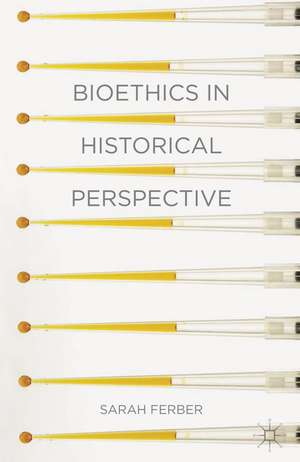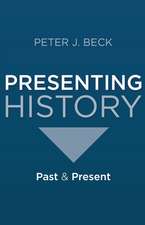Bioethics in Historical Perspective
Autor Sarah Ferberen Limba Engleză Paperback – 27 noi 2013
| Toate formatele și edițiile | Preț | Express |
|---|---|---|
| Paperback (1) | 217.09 lei 3-5 săpt. | |
| Bloomsbury Publishing – 27 noi 2013 | 217.09 lei 3-5 săpt. | |
| Hardback (1) | 567.17 lei 6-8 săpt. | |
| Bloomsbury Publishing – 27 noi 2013 | 567.17 lei 6-8 săpt. |
Preț: 217.09 lei
Nou
Puncte Express: 326
Preț estimativ în valută:
41.54€ • 43.13$ • 34.64£
41.54€ • 43.13$ • 34.64£
Carte disponibilă
Livrare economică 03-17 martie
Preluare comenzi: 021 569.72.76
Specificații
ISBN-13: 9781403987242
ISBN-10: 1403987246
Pagini: 248
Dimensiuni: 155 x 235 x 14 mm
Greutate: 0.32 kg
Ediția:2014
Editura: Bloomsbury Publishing
Colecția Red Globe Press
Locul publicării:London, United Kingdom
ISBN-10: 1403987246
Pagini: 248
Dimensiuni: 155 x 235 x 14 mm
Greutate: 0.32 kg
Ediția:2014
Editura: Bloomsbury Publishing
Colecția Red Globe Press
Locul publicării:London, United Kingdom
Caracteristici
Bioethics is highly topical and controversial: the book is structured around contemporary topical issues such as euthanasia, reproductive politics and thalidomide
Notă biografică
Sarah Ferber is Associate Professor of History at the University of Wollongong, Australia, and Chair of the University of Wollongong and regional Human Research Ethics Committee (Health and Medical). She is author of Demonic Possession and Exorcism in Early Modern France and editor, with Sally Wilde, of The Body Divided: Human Beings and Human 'Material' in Modern Medical History. You can watch her interview about Bioethics in Historical Perspective here: https://www.youtube.com/watch?v=HxOZLfDHlSM
Cuprins
Introduction 1. Bioethics as Scholarship 2. Language, Narrative and Rhetoric in Bioethics 3. Euthanasia, the Nazi Analogy and the 'Slippery Slope' 4. Heredity, Genes and Reproductive Politics 5. Human Experimentation 6. Thalidomide Conclusion Glossary.
Recenzii
This thoroughly researched and balanced introduction to bioethics discourse and its historical foundations deserves a wide readership beyond those who are interested in medical science. Students of the history of medicine, politics, the pharma industry, and social and philosophical ethics will equally benefit from reading the book.
While historians have charted how bioethics has been shaped by local social or political contexts, no one has yet analysed how readings of the past also make an important contribution to bioethical thought. Ferber does not simply analyse how various actors use history, moreover, but is also prepared to critique it . Future historians of bioethics . will undoubtedly find Bioethics in Historical Perspective an invaluable starting point for their research and teaching.
Ferber (Univ. of Wollongong, Australia) presents a thorough yet approachable introduction to the interdisciplinary field of bioethics through a historical lens. The author effectively balances the historical context of such core topics as the origins of bioethics with insightful commentary on how the disciplinary backgrounds of key players, such as Beauchamp's utilitarianism and Childress's deontology, influenced practitioners' ethical approaches. Key issues, including the history of euthanasia and its connections to the Nazis, eugenics, research on human subjects, and thalidomide, are presented thoughtfully, through approaches that emphasize multiple angles of scholarship to provoke discussions across disciplinary boundaries. This concise volume is readily accessible to readers of all backgrounds and offers substantive information relevant to scholars and practitioners in biomedicine, bioethics, health policy, and science studies fields. It is excellent introductory reading for graduate students and professionals/practitioners seeking a background survey of the field. It can also serve as a primary orienting text in undergraduate courses, touching on case studies that could be explored through other sources in more depth. Interested scholars from history or social sciences will find this a solid introductory resource as well. Summing Up: Highly recommended. *** Lower-division undergraduates and above; general readers.
Each chapter in Bioethics in Historical Perspective is rich and nuanced, and historians, social scientists and bioethicists can learn a lot from it . There is much more to learn from this fascinating book than I could cover here. I recommend it warmly to scholars in the field, and it will also be a useful textbook fora historically aware course on bioethics at undergraduate and postgraduate levels.
While historians have charted how bioethics has been shaped by local social or political contexts, no one has yet analysed how readings of the past also make an important contribution to bioethical thought. Ferber does not simply analyse how various actors use history, moreover, but is also prepared to critique it . Future historians of bioethics . will undoubtedly find Bioethics in Historical Perspective an invaluable starting point for their research and teaching.
Ferber (Univ. of Wollongong, Australia) presents a thorough yet approachable introduction to the interdisciplinary field of bioethics through a historical lens. The author effectively balances the historical context of such core topics as the origins of bioethics with insightful commentary on how the disciplinary backgrounds of key players, such as Beauchamp's utilitarianism and Childress's deontology, influenced practitioners' ethical approaches. Key issues, including the history of euthanasia and its connections to the Nazis, eugenics, research on human subjects, and thalidomide, are presented thoughtfully, through approaches that emphasize multiple angles of scholarship to provoke discussions across disciplinary boundaries. This concise volume is readily accessible to readers of all backgrounds and offers substantive information relevant to scholars and practitioners in biomedicine, bioethics, health policy, and science studies fields. It is excellent introductory reading for graduate students and professionals/practitioners seeking a background survey of the field. It can also serve as a primary orienting text in undergraduate courses, touching on case studies that could be explored through other sources in more depth. Interested scholars from history or social sciences will find this a solid introductory resource as well. Summing Up: Highly recommended. *** Lower-division undergraduates and above; general readers.
Each chapter in Bioethics in Historical Perspective is rich and nuanced, and historians, social scientists and bioethicists can learn a lot from it . There is much more to learn from this fascinating book than I could cover here. I recommend it warmly to scholars in the field, and it will also be a useful textbook fora historically aware course on bioethics at undergraduate and postgraduate levels.











